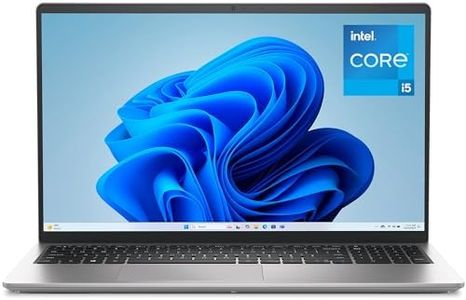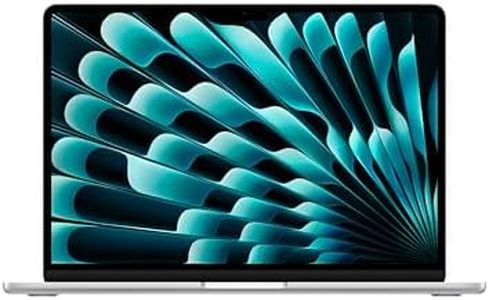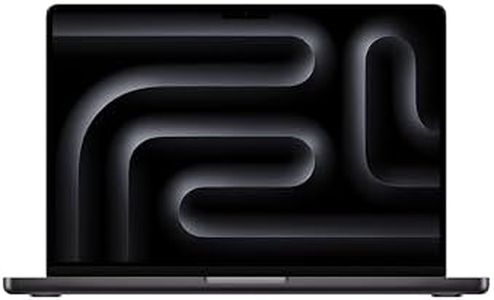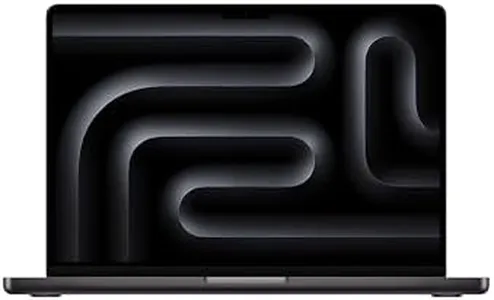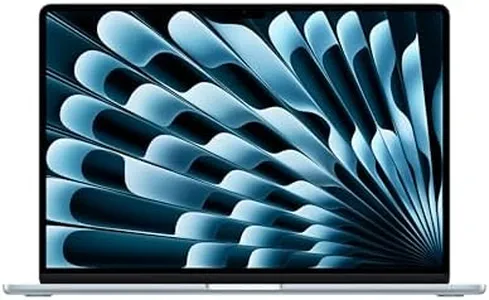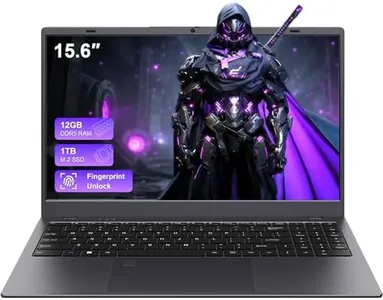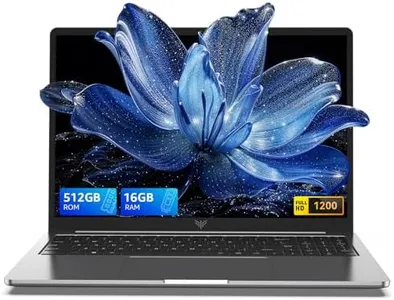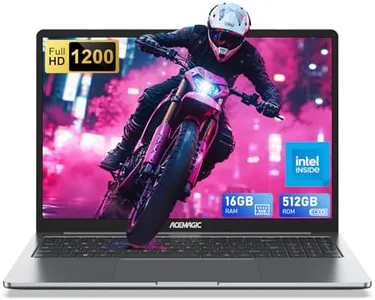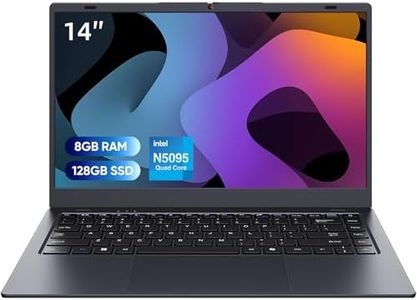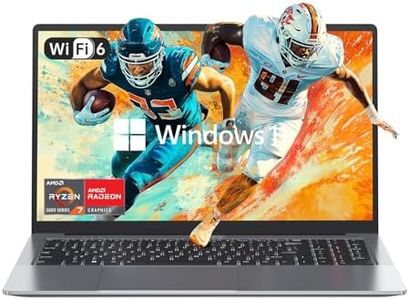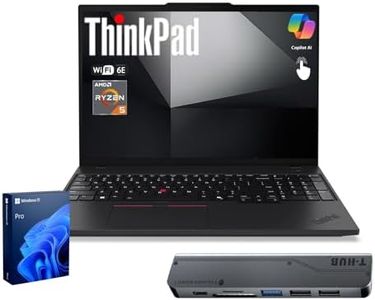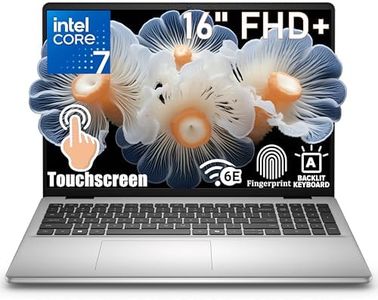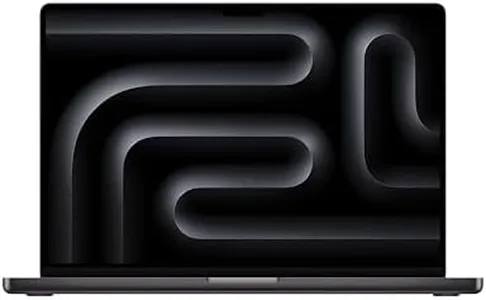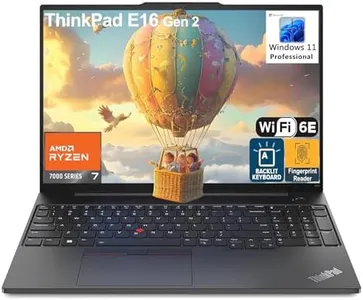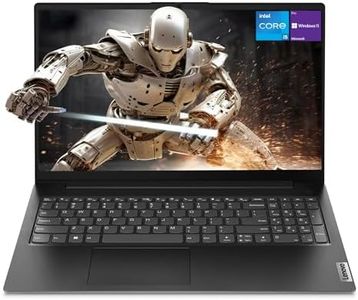10 Best Business Laptops 2026 in the United States
Our technology thoroughly searches through the online shopping world, reviewing hundreds of sites. We then process and analyze this information, updating in real-time to bring you the latest top-rated products. This way, you always get the best and most current options available.

Our Top Picks
Winner
Dell 15 Laptop DC15250-15.6-inch FHD (1920x1080) 120Hz Display, Intel Core i5-1334U Processor, 16GB DDR4 RAM, 512GB SSD, Intel UHD Graphics, Windows 11 Home, Onsite Service - Platinum Silver
Most important from
232 reviews
The Dell 15 DC15250 is a solid choice for a reliable business laptop that balances power and everyday usability. It features a 13th Gen Intel Core i5 processor with 10 cores, capable of handling typical office tasks like document editing, web browsing, and video calls smoothly without slowing down. The 16GB DDR4 RAM and 512GB SSD provide ample memory and fast storage for quick multitasking and responsive performance.
Its 15.6-inch Full HD display has a 120Hz refresh rate and an anti-glare coating, which reduces eye strain during long work sessions, while the ComfortView feature lowers blue light exposure for added comfort. Battery life benefits from an energy-efficient design and Express Charge technology, allowing for decent usage time and faster charging. The build features a practical platinum silver finish, ergonomic hinges to keep wrists comfortable, and a backlit keyboard including a numeric keypad—ideal for extensive typing or number crunching.
Connectivity options include Wi-Fi 6 (802.11ax), Bluetooth, and three USB ports (two USB 3.0 and one USB 2.0). Although there is no optical drive, which may not be critical for most users, it is worth noting. The laptop runs Windows 11 Home and comes with a 1-year onsite service, where Dell will send a technician to your location if hardware issues cannot be fixed remotely. Weighing around 3.6 pounds, it offers good portability for its class, making it well-suited for business users who need a dependable, comfortable, and reasonably powerful machine for daily productivity tasks.
Most important from
232 reviews
Apple 2025 MacBook Air 13-inch Laptop with M4 chip: Built for Apple Intelligence, 13.6-inch Liquid Retina Display, 16GB Unified Memory, 256GB SSD Storage, 12MP Center Stage Camera, Touch ID; Silver
Most important from
5863 reviews
The Apple 2025 MacBook Air with the new M4 chip is a strong choice for business users who want a powerful yet lightweight laptop. Its 10-core CPU and 16GB of unified memory provide smooth multitasking and fast performance, making it easy to work with multiple apps or handle demanding tasks like video editing or presentations. The 256GB SSD offers quick storage access, though some may find the space limited if storing lots of large files locally. The 13.6-inch Liquid Retina display is bright and sharp, with excellent color accuracy that’s great for clear visuals during client calls or creative work. Battery life is impressive, lasting up to 18 hours, which means you can often work through a full day without charging.
Build quality is premium, with a slim, durable design that’s highly portable at just 2.73 pounds. Connectivity includes two Thunderbolt 4 ports, a MagSafe charging port, and Wi-Fi 6E, covering most business needs for fast data transfer and reliable internet. The keyboard is backlit and comfortable, with Touch ID for quick and secure login, adding an extra layer of security ideal for sensitive work. The 12MP Center Stage camera and good microphone array enhance video calls, an important feature for remote meetings.
The integrated graphics might not suit businesses needing heavy 3D work, and 256GB storage could require external drives or cloud solutions for larger files. Also, the MacOS environment works best if you are already invested in the Apple ecosystem. This MacBook Air is well-suited for business professionals who value speed, portability, long battery life, and tight security, as long as their storage needs are moderate and they prefer Apple’s software.
Most important from
5863 reviews
Apple 2025 MacBook Pro Laptop with M5 chip with 10‑core CPU and GPU: Built for Apple Intelligence, 14.2-inch Liquid Retina XDR Display, 16GB Unified Memory, 512GB SSD Storage, Space Black
Most important from
425 reviews
The Apple 2025 MacBook Pro with the new M5 chip is a strong choice for business users who need a powerful, reliable machine. Its 10-core CPU and 10-core GPU deliver fast and smooth performance, especially for multitasking and demanding apps like Microsoft 365 and Adobe Creative Cloud. The 16GB of unified memory supports efficient handling of multiple tasks, while the 512GB SSD offers decent storage space with speedy access to files. The 14.2-inch Liquid Retina XDR display is bright and sharp, making it great for long hours of work with clear visuals and accurate colors. Battery life is impressive, lasting up to 24 hours for video streaming and 16 hours for web use, so you can work unplugged throughout the day without worry.
Apple’s build quality shines here; the laptop’s design is sturdy yet lightweight, and the Space Black finish adds a professional look. It also features excellent connectivity options, including three Thunderbolt 4 ports, HDMI, SD card slot, and MagSafe charging, which means you can easily connect multiple devices and displays. The backlit Magic Keyboard with Touch ID is comfortable for typing and adds security through fingerprint recognition, which is important for business use. Privacy is further enhanced by Apple’s strong security measures built into the M5 chip.
Some drawbacks include the 512GB storage which might feel limited if you work with large files regularly, and while macOS is great for many professional tools, some business-specific software may be better supported on Windows. Additionally, the price and repair costs for Apple devices can be higher than other business laptops. This MacBook Pro suits professionals who value speed, display quality, security, and a seamless experience within the Apple ecosystem.
Most important from
425 reviews
Buying Guide for the Best Business Laptops
Choosing the right business laptop is crucial for ensuring productivity, efficiency, and reliability in your work. When selecting a business laptop, it's important to consider various specifications that will meet your professional needs. These specifications will determine the laptop's performance, portability, and overall user experience. Here are some key specs to consider and how to navigate them to find the best fit for you.FAQ
Most Popular Categories Right Now
